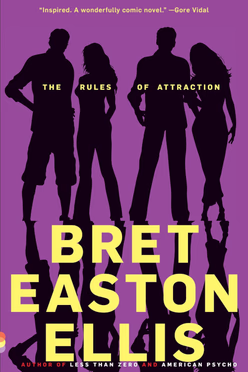The Rules of Attraction

In 1984, at Camden, a small liberal-arts college in rural New Hampshire, existentialist Paul pursues nihilistic Sean, who pursues idealistic Lauren through a series of hedonistic parties populated by vapid, bohemian classmates.
Brett Easton Ellis’s follow-up to Less Than Zero shares its first-person narration and detached tone, but lacks its resonant sense of existential dread. Instead, it proffers a biting sense of black comedy. Consider Paul’s ask when driving their overdosing friend to the emergency room.
We were almost there, a smallish brick structure that sat next to a vast, empty parking lot, near the end of town. Beyond that, the woods, a forest that stretched for miles. No one was saying anything. We passed a liquor store.
“Could you stop? I need cigarettes,” I said, checking my pockets.
“Can I remind you that we have someone ODing in the backseat?” Donald said.
Raymond was hunched over the wheel, looking worried, like he could use a cigarette and was seriously considering it.
I ignored Donald and said, “It’ll just take a minute.”
Or his reaction later in the ER:
None of us said a word. It irritated me that Raymond and Donald not only made me miss this all-important meeting but also that they were wearing the same long wool jacket I was wearing.
Ellis makes bold choices, such as including an entire chapter narrated by Sean’s French roommate—written in French. But ambiguity defines the book.
Consider how Paul details multiple sexual encounters between himself and Sean, but these are absent from Sean’s recounting of events. Does their romance exist only in Paul’s mind?
Ellis does clarify the disconnect of their first drunken meeting, where Sean asks Paul to dinner, suggesting they “get a quesadilla.” Pivoting to Sean’s POV, I laughed aloud at the true story.
Denton’s got some bucks so I ask him if he wants to go with me and get a case of beer and the guy is so drunk he asks me if I want to have dinner with him tomorrow and I guess I’m drunk too and I say sure even though I don’t know why
More ambiguity with Lauren, who recollects this exchange with Sean:
“I want to know you,” Sean whines.
“What?”
“Know you. I want to know you.” Pleading.
“What does that mean? Know me?” I ask him. “Know me? No one ever knows anyone. Ever. You will never know me.”
“Listen,” he says, touching my hands.
“Will you calm down,” I tell him. “Do you want some Motrin?”
This rings truer with the speakers reversed, leading us to question Lauren’s credibility as a narrator.
Indeed, Sean proves the most reliable—but on a sliding scale. Ellis embraces this absurdity:
“I’ll find someone. Getch’ll do it.”
“Getch has Music for the Handicapped now,” he tells me.
I knew that. “Does he?” I ask.
“Yes.”
“I didn’t know that,” I say. “I didn’t know Getch took that.”
Music for the Handicapped. It’s never mentioned before or after, just tossed out in passing. I love it.
And I appreciated Ellis’s nod to Donna Tartt’s The Secret History.
But who doesn’t go to The Dressed To Get Screwed party, besides that weird Classics group (and they’re probably roaming the countryside sacrificing farmers and performing pagan rituals)?
Ellis and Tartt both attended Bennington College, which served as the basis for both Camden and The Secret History’s Hampden.
The novel also features two notable guest appearances. Less Than Zero’s protagonist Clay narrates a chapter, providing a sad coda that sees him longing to return to Los Angeles. Sean’s brother Patrick also narrates a chapter. He’s not as fleshed out as he would be in American Psycho, but he’s close, exhibiting his trademark mix of aggression and paranoia.
Full disclosure: I’d seen—and loved—the Rules of Attraction movie before reading the book. So in my mind’s eye, James Van Der Beek is Sean, Ian Somerhalder is Paul, and Shannyn Sossamon is Lauren. This worked fine (aside from Paul and Lauren’s blonde hair in the book), but I found it hard to envision Van Der Beek wearing this outfit:
After dinner at Jams, me and Robert go to Trader Vic’s. I’m wearing a paisley smoking jacket and a bowtie I found in my father’s closet at The Carlyle.
All this said, as much as I appreciated Ellis’s sense of humor, the book feels like a segue between the existential dread of Less Than Zero and the black satire of American Psycho. Caught between the two, it cannot match either. Yet I can’t help but enjoy it, if only for bits like this:
An especially loud New Order song comes from the open windows at McCullough, “Your Silent Face.” Sean liked this song, so did Mitchell in fact. Gerald says, “Jesus, I really hate this song.” I kiss him once more. It turns out to be the last song of the party. It fades out, nothing replaces it.
Reading History
- 2022Jul14ThuKindle (Vintage Contemporaries)
Read over 13 Days
- 2 Jul 20229%
- 4 Jul 202225%
- 5 Jul 202236%
- 6 Jul 202256%
- 11 Jul 202261%
- 12 Jul 202271%
- 13 Jul 202280%
- 14 Jul 2022Finished